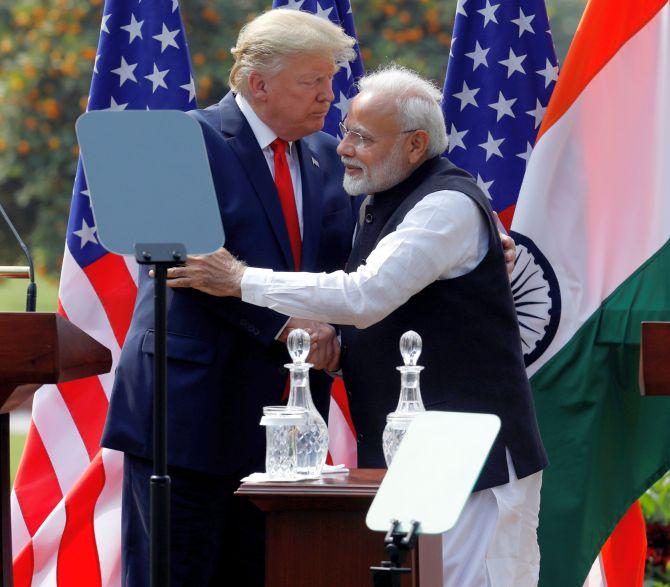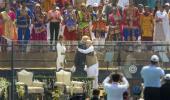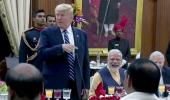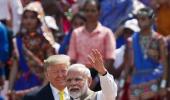'New Delhi and Washington are now on the same page, on dealing with growing Chinese assertiveness, across the entire Indo-Pacific region,' notes Ambassador G Parthasarathy, Chancellor, Central University of Jammu.

President Donald J Trump's two-day visit to India left him dazzled by the warmth of the reception he received. While the crowds in Ahmedabad and Agra were delighted to welcome the president of the United States, television audiences across the country were moved by the close attention that Melania Trump paid, to exchanging views with the students and teachers of the school in New Delhi, which she chose to visit. She thrilled the students and teachers alike, during their interaction.
In the meantime, President Trump's daughter Ivanka Trump was a great hit at the public meeting attended by over 100,000 spectators organised at what is the largest cricket stadium in the world. Ivanka's simplicity and readiness to exchange banter with ordinary people at the stadium attracted attention.
The icing on the cake was, of course, President Trump and Melania Trump walking hand in hand briefly towards the majestic Taj Mahal. Once the fun, sightseeing and games were over, it was back to business after Air Force One landed in Delhi the same evening. President Trump was received at Rashtrapati Bhavan for a ceremonial guard of honour the next morning.
The talks in Delhi were business-like and made relatively simple, as substantive negotiations had been held well before Trump arrived in India, with his team of high-level officials. The most important pending issue in relations with the US now is the resolution of differences on issues of bilateral trade.
These issues, thanks to Trump's 'America First' trade protectionism, affect US trade relations with dozens of countries, ranging from Japan and China, to India and members of the European Union. These are countries where the Trump administration has introduced new trade barriers by increasing import duties.
Trump's complaints about India ranged from high import duties imposed on Harley Davidson motorcycles to Indian exports like steel and aluminum. There have been tit for tat moves on both sides, with India, in turn, raising duties on US agricultural products.
There have been continuing differences on these issues. India insists on the return of trade preferences it is entitled to under WTO norms, as a developing country. This is something the Trump administration has appeared reluctant to agree to, even now.
There are, however, indications that with India agreeing to step up its purchases of oil and natural gas from the US, one can address Trump's aversion to having trade deficits with India and others realistically.
India does not, however, face the kind of wide-ranging policy changes that China is now required to make to meet the Trump administration's admimistration. India's response to Trump's personal request for reducing duties on Harley Davidson mtorcycles should, however, have been more imaginative.
Milwaukee, in Wisconsin, where the Harley Davidson motorcycles are produced, is of considerable political importance in Trump's re-election effort. He has a personal interest in backing the motorbike producers there. Moreover, the heavy Harley Davidson motorcycles are hardly suitable for most roads in India. These motorbikes would not enthuse too many Indians.
Trump, however, appeared quite pleased with his meeting with top Indian industrialists, especially when he discussed proposals of Indian companies investing in the US in steel plants. JSW Steel has agreed to invest an additional $500 million to upgrade a newly acquired steel plant in Ohio.
India and indeed the world are now noting that the Trump administration is bent on reversing the entire process of globalisation which took shape over the past three decades, with a return to an era of growing protectionism.
This has been combined with efforts to persuade India to accept American exports of frontline, but expensive US weapons systems. India will purchase a number of Apache helicopters in the coming months.
Negotiations have also now reached an advanced stage for the construction of six nuclear reactors by Westinghouse America in Andhra Pradesh, after Westinghouse was backed strongly by the Trump administration. These reactors will supplement nuclear power reactors installed in Kudankulam, Tamil Nadu, by Russia.
Interestingly, while President George W Bush was responsible for ending global nuclear sanctions against India, imposed after its 1998 nuclear tests, no US company was in a position to supply India the type of nuclear power reactors it needed for over a decade.
New Delhi and Washington are now on the same page, on dealing with growing Chinese assertiveness, across the entire Indo-Pacific region. Both countries are concerned about the increasing Chinese readiness to use force and coercion to expand its maritime frontiers, across the South China Sea.
It was agreed that the Quad, comprising the US, Japan, Australia and India would enhance maritime cooperation. ASEAN countries are being advised to stand firm on exaggerated claims by China on its maritime boundaries which are in violation of international law.
The Quad is set to work together to deal with Chinese pressures on countries like Sri Lanka and the Maldives, by their involvement in construction projects in these countries, which lead the recipients into unrepayable debts. The recipients are then compelled to hand over strategic ports like Hambantota in Sri Lanka to Chinese control.
India and the US have noted the need for China and recipient countries to 'ensure responsible, transparent and sustainable financing practices for both borrowers and creditors'.
India has been facing increasingly hostile Chinese policies, not just on bilateral ties, but also on the issue of Jammu and Kashmir. This is alongside China's growing maritime and military ties with Pakistan.
New Delhi now appears to have decided to respond to Chinese policies affecting India's interests more strongly. This would especially be in regard to Chinese actions in the United Nations. China has got away too easily in fora like the UN human rights commission.
India should now seek to join others and expose China for its gross violation of the human rights of its Muslim population in Xinjiang province, where over two million Uighur Muslims are virtually under arrest. Likewise, China is also violating its own international commitments, by endeavoring to crush democratic freedom in Hong Kong.
China is aware of the cooperation between India and Japan to coordinate their economic cooperation policies in countries like Myanmar, Sri Lanka and the Maldives, to deal with Chinese attempts to get a strategic presence and military bases in such countries. The announcement that India would cooperate with the US on such issues will be seriously taken note of in China.
The impending American withdrawal from Afghanistan was only to be expected. President Trump appears determined to withdraw American combat forces from Afghanistan well before Election Day in November. He needs to make it clear to Pakistan that the continuation of its assistance and cooperation to the Haqqani Network would be viewed seriously.
The US needs to be advised that Afghan forces would continue to need air power support to deal with what is essentially a cross-border insurgency.
Sadly, President Trump's visit was marred by communal violence on the last day of his stay in India's capital. One hopes that the government moves to act severely against all those responsible for the violence in Delhi, irrespective of their political affiliations.
Ambassador G Parthasararthy retired from the Indian Foreign Service after serving as India's high commissioner in Pakistan. Before joining the IFS -- where he had a distinguished career -- Ambassador Parthasarathy served in the Indian Army and fought the 1965 War.










